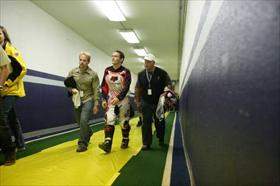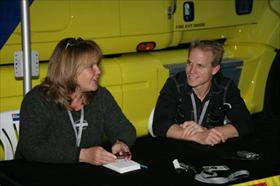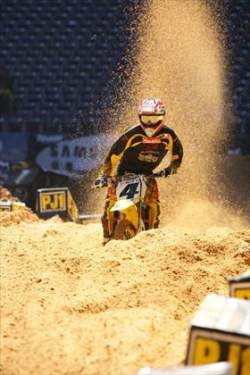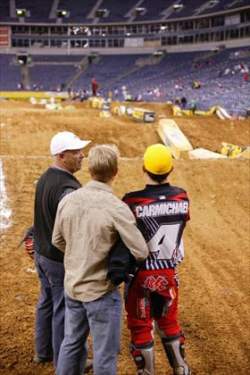Racer X/Moto XXX Virtual Trainer
If
you’re a fan of motocross and fitness, Aldon Baker may have one of the
coolest jobs in the industry: Baker gets to ride and train every day
with the Ricky Carmichael. He also has the distinct pleasure of being
the man responsible for transforming Carmichael from an unconditioned
kid on a 125 to a physically fit man on a 450. Any champion will tell
you that it takes hard work, dedication, and a full team of experts
backing you up to reach the top. Aldon is one of the key experts
involved in making sure that RC remains the G.O.A.T for many years to
come. This is what he had to say on training for MX. 
Aldon Baker and Fox Racing's Scott Taylor flank Ricky Carmichael photo: Simon Cudby
Racer X: Aldon, to get started, what is your background and how did you get into MX training?
Aldon Baker: Well, originally, I was a personal trainer and received
all my training in London, actually. I was with two sort-of big
companies and big gyms in London for about four years. From there I got
hooked on mountain biking. My dad comes from running and is a top
marathon runner back in South Africa, but he had an injury, and part of
his recovery was to cycle. So with that, I was always involved in
running or cycling. So to make a long story short, I raced a couple of
years in South Africa and did really good there but realized you had to
get out onto the world scene to really do anything, at least to do it
professionally. I came to America, spent a couple of months here, did a
few races, and got a sponsorship here in the States. That’s what I did
for another four years professionally and then retired out of that.
|
What exactly does your job entail being RC’s trainer? Do you set his day-to-day schedule and things like that, or are you just there for guidance?
I plan his training schedule to fit in with the riding and racing, both cardio and strength. I also go with RC to the tracks for his practice. I have been with him long enough now to see how his riding is improving and what he needs on a day-to-day basis. His mother is a huge part of how he operates each day by taking lap times and keeping his structure at the track and making sure no corners are cut in that area. His dad keeps up all the bike maintenance and also keeps an eye on the overall setup. While Ricky is out riding, it helps me to determine not only his physical state, but his mental state as well. I am basically with Ricky from 8 to 5 every day. We basically meet every morning and train, and then we break for breakfast. Then we go out to the track, and then off to the gym. And then we finish up with anything else after that.
|
Yeah, I do all the training with him too, which is good because I can get an idea of how he is coping with the training, and when he gives me feedback, I know what he is talking about.
So when you say you do all the training with him, do you ride MX also?
Not every day, but I do suit up and take it for the team—I am totally an amateur on the MX track! I ride with him on the outdoor track, but I don’t dare touch the SX track. I don’t want to kill myself on one of those things. I ride so that I don’t lose sight of what he is talking about and what he is dealing with. It also makes him feel like there’s someone else out there with him sweating and kind of suffering. I mean, it’s a lot harder for me to do a 40-minute moto than him, that’s for sure. I can’t do all the jumps and stuff that he does, but afterwards when we go to the gym, he can’t say to me, “Man, I’m beat, look at all the riding I did today and I still have to go to the gym!” Because I’m going with and I’m going to do the same stuff you’re going to do.
It really balances out well. Over the years we have really become close and I look at him as a brother to me. It’s personal too, which is nice, and we really have a good relationship. But then on the other hand, he understands as well as I do that there is a line drawn. You have to have a friendship and you have to have the trust, but you also can’t be too buddy-buddy so that you feel bad for the guy and want to start letting him off the hook and stuff. It also works out pretty well that I am a lot older than Ricky. That helps with the balance.
Can you elaborate a little on what type of supplemental training RC does and how you combine that with his riding?
Well, the training itself all varies throughout the season. People always ask me what we do to train, and that always depends on the part of the season we’re in. Like in the semi-off-season, we do our base work, but it’s somewhat hard because our seasons are back-to-back and long. But overall, it’s quite a full day between riding and training. If we can’t get enough riding in one day, then we balance that out with cardio at the gym. Ricky obviously gets to ride a lot, and a lot of his conditioning comes from that, so we’re always trying to find a balance between the two. He rides to keep himself sharp and up to speed and trains off the track to fill in the gaps. You definitely need to ride a lot if you want to be in great shape. The cardio is structured throughout the year where we train the whole line of intensity and endurance. Everything is based from how Ricky is feeling on the bike. I develop all of his training from testing and info when he is riding the bike. Everything is based on that. And that is structured over the whole year.
So from my past experience, I have developed a four-year program because it’s based on when I trained for the Olympics, and then structured it down and linked it to MX heart rates and actual motocross time. We don’t train like we’re going to race the Tour de France or a marathon. We’re constantly adjusting Ricky’s program and trying to figure out where we need work and what we need to fix. Some areas of his conditioning will excel while others may start to come up short. It’s difficult for me to pinpoint exactly what we do, because things change so much, but there is certainly a structured plan to it all.
|
Oh, for sure, Ricky definitely strength trains throughout the year. I think it is super important. I have heard of guys who just do their strength training in the off-season and then not during the season. Ricky does it all year round. It has helped Ricky out immensely just from going from the 125 to the 250 and now to the 450. I mean, if he was the same guy from back in the day and only did cardio, he wouldn’t be able to hold on now! But strength training has to be very specific to MX to be beneficial. I think leg strength is crucial. Core strength is also important since it’s the hinge between the legs and the upper body. Your back and posterior are also important. Strength training is also very specific to what the individual rider needs. I mean, a tall, lanky guy probably isn’t going to have much natural leg strength versus someone who is shorter. Maturity is also a big factor. Someone who is 16 may not be ready for intense strength training since they haven’t matured as much as someone who is 23.
(Check back on Monday for Part Two of our interview with Aldon Baker)





